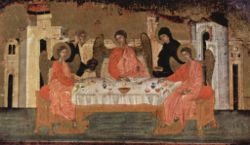Difference between revisions of "Hospitality"
| Line 2: | Line 2: | ||
[[Image:Meister der Ikone der Trinität 001.jpg|right|frame|<center>[[Abraham]] offering hospitality to [[angel]]s</center>]] | [[Image:Meister der Ikone der Trinität 001.jpg|right|frame|<center>[[Abraham]] offering hospitality to [[angel]]s</center>]] | ||
| − | '''Hospitality''' refers to the relationship | + | '''Hospitality''' refers to the relationship between guests and their host. It refers to the act or practice of being hospitable, that is, the generous reception and caring for guests, visitors, or strangers. While hospitality may refer to the hospitality industry and services that deal with [[tourist]]s, the archaic meaning of hospital is a "hospice for travelers or pilgrims" that relates to hospitality as the act of providing care and kindness to travelers in need. |
==Contemporary usage== | ==Contemporary usage== | ||
| − | Contemporary usage seems different from historical | + | Contemporary usage seems different from the historical use emphasizing personal attitudes. Today's hospitality may pertain to the staging of parties, hosts entertaining, or the hospitality industry as part of the [[entertainment]] industry. In contrast, hospitality traditionally has been associated with a sense of devotion to those appearing as 'strangers'. |
==Biblical and Middle Eastern== | ==Biblical and Middle Eastern== | ||
In Middle Eastern Culture, it was considered a cultural norm to take care of the strangers and foreigners living among you. These norms are reflected in many Biblical commands and examples.[http://bible.gospelcom.net/passage/?search=Exodus%2022:21;23:9;%20Leviticus%2019:10,33,34;24:22;%20Deuteronomy%2010:18] | In Middle Eastern Culture, it was considered a cultural norm to take care of the strangers and foreigners living among you. These norms are reflected in many Biblical commands and examples.[http://bible.gospelcom.net/passage/?search=Exodus%2022:21;23:9;%20Leviticus%2019:10,33,34;24:22;%20Deuteronomy%2010:18] | ||
| − | + | An example is provided in Genesis where Lot provides hospitality to a group of angels (who he thinks are men); when a mob tries to rape them. Lot goes so far as to offer his own daughters as a substitute, saying "Don't do anything to these men, for they have come under the protection of my roof." (Genesis 19:8, NIV). | |
==Further reading== | ==Further reading== | ||
Revision as of 00:42, 4 May 2008
Hospitality refers to the relationship between guests and their host. It refers to the act or practice of being hospitable, that is, the generous reception and caring for guests, visitors, or strangers. While hospitality may refer to the hospitality industry and services that deal with tourists, the archaic meaning of hospital is a "hospice for travelers or pilgrims" that relates to hospitality as the act of providing care and kindness to travelers in need.
Contemporary usage
Contemporary usage seems different from the historical use emphasizing personal attitudes. Today's hospitality may pertain to the staging of parties, hosts entertaining, or the hospitality industry as part of the entertainment industry. In contrast, hospitality traditionally has been associated with a sense of devotion to those appearing as 'strangers'.
Biblical and Middle Eastern
In Middle Eastern Culture, it was considered a cultural norm to take care of the strangers and foreigners living among you. These norms are reflected in many Biblical commands and examples.[1]
An example is provided in Genesis where Lot provides hospitality to a group of angels (who he thinks are men); when a mob tries to rape them. Lot goes so far as to offer his own daughters as a substitute, saying "Don't do anything to these men, for they have come under the protection of my roof." (Genesis 19:8, NIV).
Further reading
Of Hospitality - Jacques Derrida, translated by Rachel Bowlby (Stanford: Stanford University Press, 2000).
